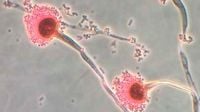As the planet warms, nature is beginning to fight back in ways both unexpected and deeply troubling. A new study has revealed that a "killer fungus," long confined to tropical and subtropical regions, could soon invade Europe and the UK, driven north by the relentless march of climate change. This is not fiction; it is science, and its warnings are becoming impossible to ignore.
The culprit is the Aspergillus genus, a group of fungi that can infect the human brain, spoil livestock feed, and render food crops toxic. In hotter climates, millions of people each year are already exposed to its dangers. But as temperatures climb, its reach is expanding—northward into Europe and potentially across the British Isles.
The new study suggests that even in a best-case warming scenario, with average global temperatures increasing by 2°C, Aspergillus fumigatus and Aspergillus flavus will likely spread into the UK and Scandinavia. The more aggressive Aspergillus niger could infect up to 10 million more people across Europe. The consequences could be dire. While healthy individuals may naturally fight off fungal spores, immunocompromised or vulnerable people are at high risk. Invasive aspergillosis, a lung-borne infection caused by inhaling Aspergillus spores, can rapidly spread to other organs, including the brain. Globally, it already claims up to 1.8 million lives each year.
Dr. Norman van Rhijn of Manchester University, the lead author of the study, warned that there are few effective antifungal drugs, many strains are becoming drug-resistant, and diagnoses are frequently missed or delayed. "Reality is already scary enough," Dr. van Rhijn stated, alluding to the fungal apocalypse portrayed in the TV series The Last of Us. But this isn’t science fiction; it’s happening now.
Fungi are everywhere: in the soil, the air, even within our bodies. They are a fundamental part of the Earth’s ecosystems, helping decompose organic matter and sequester carbon. But more than 90% of fungal species are still unknown to science. Their roles, both beneficial and harmful, are poorly understood, especially in the context of a rapidly changing climate.
Despite this, fungi have been curiously underrepresented in climate and health discourse. Perhaps this is because their effects are more insidious, creeping into lungs, food chains, and farms unnoticed until the damage is done. Climate change, long warned about by scientists and increasingly visible in everyday life, is now enabling diseases to travel farther, faster. The same warming that is moving mosquitoes carrying malaria and dengue into new territories is also shifting the habitats of fungal pathogens.
Even in Africa, where the fungus has long thrived, some regions may soon become too hot for its survival—a grim irony that illustrates just how profound and unpredictable the effects of climate change will be. And yet, despite the mounting evidence, climate denial continues to stall urgent action. For decades, the voices of researchers and environmentalists have been drowned out by lobbyists, oil-funded interests, and ideological intransigence.
Even today, some continue to belittle climate concerns as alarmism, willfully ignoring the interconnected crises unfolding—from melting glaciers and extreme weather to global health threats like these emerging pathogens. Professor Dann Mitchell of Bristol University, who was not involved in the research, warned that health systems must now learn to identify and respond to infections in unfamiliar places. "Misdiagnosis is common when pathogens appear in regions where doctors have never seen them before," he said.
That blind spot is exacerbated by decades of neglect—not just in medical training, but in policy. The Wellcome Trust, which funded the study, echoed this urgency. "Fungal pathogens pose a serious threat to human health by causing infections and disrupting food systems," said research manager Viv Goosens. "Climate change will make these risks worse. To address these challenges, we must fill important research gaps." But identifying gaps is not enough. As this latest warning makes clear, we are running out of time to act.
Climate change is no longer a distant possibility; it is a lived reality, reshaping the biological world around us in ways that are difficult to predict and dangerous to ignore. We were warned. We cannot now say otherwise.



